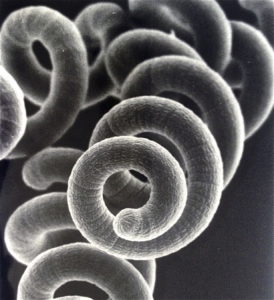
History
Spirulina is one of the oldest living beings on the planet. This cyanobacterium appeared about 3.5 billion years ago and is one of the first organisms that contributed to the expansion of life on Earth. Their production of oxygen through photosynthesis created the ozone layer and thus the atmosphere, and life as we know it today.
Thanks to its capacity of adaptation and its exceptional immune defenses, this very distant ancestor (which is like a stem cell of humanity) was able to survive all the climatic changes until our days. Its DNA has never been modified for human needs, as is the case with most of the food we consume today, which has been selected solely on the basis of appearance and productivity.
In its natural state, spirulina lives mainly in volcanic lakes in hot and desert regions, mainly in West Africa. Gilles also discovered spirulina on the coast in Peru, and near his farm in the Petite Camargue.
Consumed by the first peoples such as the Aztecs, it is still today a traditional food of the Kanembous of Chad. In the 1980s, the physical resistance of these people intrigued a team of anthropologists and nutritionists. Since then, analyses have revealed the extraordinary composition of spirulina: it is the richest known food in proteins (3 times more than meat), but also in betacarotene (15 times more than carrots), and in iron. It also contains all the vitamin B complex and especially the B12 so dear to vegetarians. SPIRULINE and GILLES: VIDEO (in French) by LE CHOU BRAVE
Properties
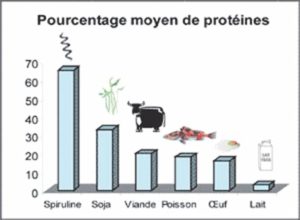 The exceptional composition of spirulina in proteins, vitamins and minerals makes it one of the most complete foods on the planet. It is particularly recommended for children, pregnant women, the elderly, vegetarians, sportsmen, for convalescent and tired people in general.
The exceptional composition of spirulina in proteins, vitamins and minerals makes it one of the most complete foods on the planet. It is particularly recommended for children, pregnant women, the elderly, vegetarians, sportsmen, for convalescent and tired people in general.
In a society where the composition of food is increasingly poor and uncertain, where our defenses must be strengthened to cope with external aggression, and where more and more performance is required of us, spirulina is an effective solution and one that is accessible to all.
Thanks to the presence of phycocyanine and other molecules that are very specific to it, spirulina improves the immune system and is a valuable ally for people with cancer or HIV.
A powerful detoxifier, spirulina may reduce the side effects of chemotherapy, may contribute to the elimination of heavy metals and radioactivity by contaminated people.
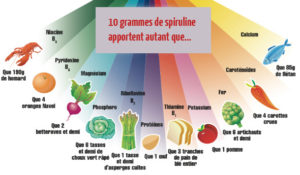
Bibliography
Scientific studies have also revealed that it is effective in the prevention of cardiovascular disease, hypertension, diabetes, cholesterol, and anemia (see link below)
Thesis of pharmacy of Hélène CRUCHOT (French)
Thesis of pharmacy of Sébastien SGUERA (French)
Phytotherapy conference, Faculty of Medicine, Paris (French)
With so many qualities, why is spirulina so little known and valued?
Spirulina is a natural food that cannot be patented and is therefore excluded from the strategies of the big pharmaceutical laboratories. As a result, its properties are very little disclosed due to lack of means and interest.
Gilles wants to make spirulina accessible to as many people as possible. Degressive pricing is proposed to stimulate the consumption of spirulina, to make it more accessible, and to encourage group purchases. For example, the consumption of spirulina in 1kg packaging package costs 0,5 € per day (5 g/d).
Fresh Spirulina
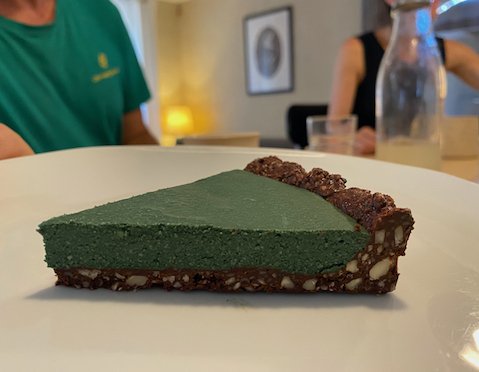
“Le Vert Luisan” Spirulina is produced with awareness respect of this organism’s natural needs, and following the principles of permaculture. No synthetic fertilizers are used and it is fed according its real needs (reasoned culture). Spirulina is offered FRESH to promote living food. It is thus much more pleasant to consume and has particular properties among other things because of its composition in Vitamins C, enzymes and probiotics absent in dry spirulina.
Fresh spirulina has a neutral taste, a creamy appearance; it can be mixed into many sweet or savory recipes without changing the flavor. It is even a taste enhancer for the foods with which it is prepared.
It acts favorably on intestinal transit, and it seems particularly beneficial for people suffering from hypothyroidism; testimony in a video (from the 25 minutes onward, in French) of a person who cultivates it to enjoy it fresh daily.
Spirulina and malnutrition
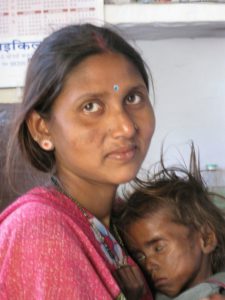
Spirulina is most impressive in its effectiveness against malnutrition in children. When we know that 2g/day of spirulina can give life back to a malnourished child, accepting starvation as a fatality is no longer possible. As Ripley Fox, who dedicated his life to the cause of spirulina, rightly said: malnutrition is not a disease; it is a consequence of an unbalanced and unjust international economic policy.

Indeed, spirulina can be cultivated by all, for all, and everywhere, even in the most arid areas of the planet. Requiring very little water and means, it has a remarkable productivity. It produces 260 times more protein per hectare per year than beef, and 30 times more than soybeans, while consuming 40 times less water than the former, and 3.5 times less than the latter!
Apart from all the economic speculation around development aid, where the policy is to sell off the surpluses from rich countries, there are real sustainable solutions for the poorest and most deprived regions of the world: SPIRULINA is one of them.
The multiplication of production farms in Africa has not solved the problem of malnutrition on the spot. Indeed, because of its high cost, spirulina is not accessible to the most needy, and it is mostly exported. This trend will take a long time to change, as production costs must be drastically reduced. This is what Gilles is doing on his experimental farm in La Roquette.
The “solidarity” qualification of spirulina on sale on the site is derived from in supporting a local producer (in a monastery) who distributes part of his spirulina in dispensaries for children suffering from malnutrition in Burkina-Faso.
After having worked for many years to promote the cultivation of spirulina in developing countries, with the association ACMA (Association pour Combattre la Malnutrition par l’Algoculture) “Les Idées bleues” and then “Univers la Vie”. Gilles is now more and more oriented towards teaching courses (soon online) to make his knowlege accessible to the largest number.
Spirulina, the source of all life, is an important key to food autonomy.
When cultivated with full awareness; it considerably raises the vibration of the people who consume it
LONG LIVE SPIRULINA FOR ALL!